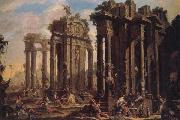Wholesale Oil Painting No Minimum |
|||||||||||
|
|
|||||||||||

|
|||||||||||
|
|
|
||||||||
MAGNASCO, AlessandroItalian Rococo Era Painter, 1667-1749 Painter and draughtsman, son of (1) Stefano Magnasco. He did not study with his father, who died when he was a small child. He went to Milan, probably between 1681 and 1682, and entered the workshop of Filippo Abbiati (1640-1715). His Christ Carrying the Cross (Vitali, priv. col., see Franchini Guelfi, 1987, fig. 238) faithfully repeats the subject and composition of Abbiati's painting of the same subject (Pavia, Pin. Malaspina). Alessandro Magnasco's early works were influenced by the harsh and dramatic art of 17th-century Lombardy, with dramatic contrasts of light and dark and livid, earthy tones, far removed from the bright, glowing colours of contemporary Genoese painting. The depiction of extreme emotion in the St Francis in Ecstasy (Genoa, Gal. Pal. Bianco) was inspired by Francesco Cairo's Dream of Elijah (Milan, S Antonio Abate). However, Magnasco was already expressing himself in a very personal manner, with forms fragmented by swift brushstrokes and darting flashes of light. The Quaker Meeting (1695; ex-Vigan? priv. col., see Franchini Guelfi, 1991, no. 18) is one of his first genre scenes. In this early period he specialized as a figurista, creating small human figures to be inserted in the landscapes and architectural settings of other painters. He also began collaborating with the landscape painter Antonio Francesco Peruzzini, with a specialist in perspective effects, |
||||||||
|
|
||||||||
Bandits'Stopping-place
Bandits'Stopping-place Painting ID:: 28342 |
mk60
Oil on canvas
44x64"
mk60 Oil on canvas 44x64" |
|||||||
|
CONTACT US |

